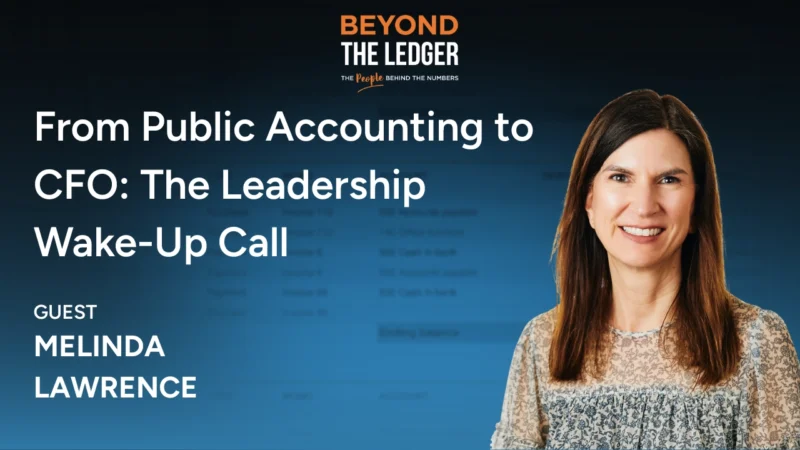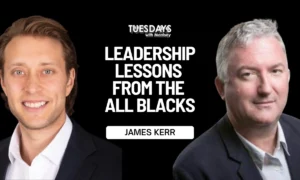How Expert Content and Influencer Marketing Are Revolutionizing B2B Growth in the Creator Economy
The Creator Economy is changing how businesses grow, especially in B2B. Platforms like YouTube, Instagram, and TikTok, with nearly 5 billion monthly users, are driving this change. By 2027, Goldman Sachs expects the Creator Economy to reach $500 billion. It’s time for businesses to get involved.
What’s exciting is how influencer marketing, once reserved for consumer brands, is now revolutionizing B2B. Influencers have evolved from trendsetters to trusted voices that add real value to professional communities. And that’s exactly what businesses need: authenticity that cuts through the noise.
Seventy-five percent of companies are already using influencers, and 93% are planning to do more. Why? Because trust drives sales, and in B2B, credibility is everything.
This isn’t just another marketing tactic; it’s a game-changing strategy. In a recent episode of Expert Talk, I sat down with Gabrielle Bejarano and David Kemp to dive into how influencers and expert content are transforming B2B marketing.
What’s Driving the 20x Growth in Influencer Marketing?
Influencer marketing’s 20x growth since 2016 is more than just a trend. Today, anyone can become a “Creator,” thanks to social media tools and low barriers to entry.
In B2B, it’s all about community. Buyers are looking for meaningful connections, whether through conferences, knowledgeable sales reps, or insightful content that goes beyond the typical brochure.
This demand for depth has pushed B2B marketers to adopt strategies once seen in B2C. As Roberto Blake says, “In B2C, you gain followers with personality; in B2B, you earn respect by sharing expertise.”
B2B influencer marketing is all about connecting with respected experts and repurposing their insights across platforms.
Unlike B2C, the competition in B2B content is minimal. Most companies aren’t producing much, making it the perfect time to establish authority.
David highlighted a key point: B2B needs to rethink the term ‘influencer.’ It’s about thought leadership. While terms like ‘influencer,’ ‘expert,’ and ‘creator’ overlap, ‘influencer’ often feels intimidating, especially with TikTok and younger audiences.
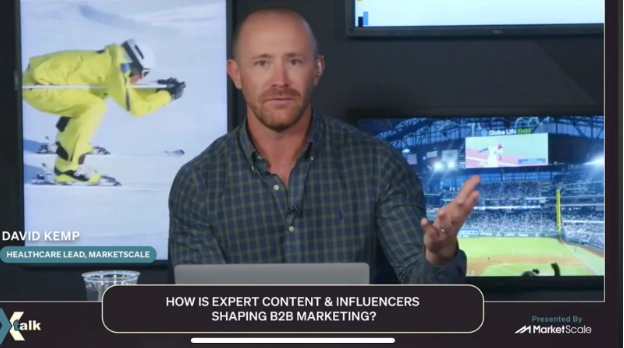
B2B professionals connect better with terms like ‘expert’ or ‘educator.’ By positioning them as thought leaders, they can share their knowledge, engaging and educating their community.
Why B2B Doesn’t Need Flashy Influencers to Succeed
There’s a misconception that B2B requires TikTok stars or viral content. This mindset often leads to misguided efforts, such as collecting user-generated content (UGC) from dancing teens or chasing irrelevant trends.
Instead, success lies in leveraging people your community already trusts—team members, customers, suppliers, or conference peers.
Take my friend Landry St. Clair. She runs digital marketing for an oil company that supplies restoration firms. Niche, right? She’d never considered herself an influencer. But when I told her, “You’ve got stories worth sharing,” she started capturing conversations on her iPhone.
This simple shift revealed how valuable her insights were. She began asking industry-specific questions and creating authentic content without trying to be an influencer.
You don’t need flashy production or a million followers. Two years ago, I had a health scare and reached out to Dr. Philip Ovadia, author of Stay Off My Operating Table. I thought he’d never respond, but he agreed to an interview. That one conversation led to interviews with top doctors in metabolic health, stem cells, and even Tony Robbins’ medical director.
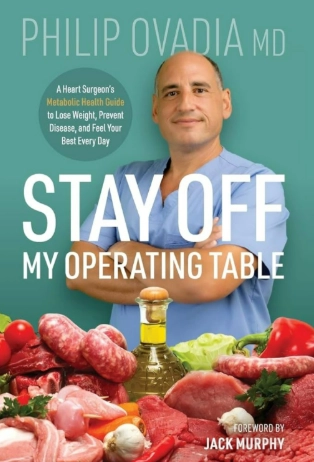
Most experts in your industry are happy to share their knowledge. That one Zoom call can turn into a podcast, YouTube video, social media post, TikTok, blog, or company newsletter.
Without spending on expensive cameras or agencies, you’ve created a complete UGC and social media strategy. It’s as simple as turning conversations into content.
Why Leveraging Internal Experts Isn’t a Fad
This strategy isn’t a fad, it’s here to stay because it’s cost-effective. The experts you need are already on your payroll. You’ve hired them for their industry knowledge, so why not let them share their insights?
It’s almost wasteful not to. By tapping into your team’s expertise, you create content that you own. Unlike paid ads, this content becomes a lasting asset, repurposable indefinitely.
The cost-effectiveness speaks for itself. You don’t need outside influencers or media space. The people you already have can create content that drives growth at minimal cost.
It aligns with how decision-makers engage today. In their personal lives, they interact with influencer-driven content, and that doesn’t change when they step into a professional setting.
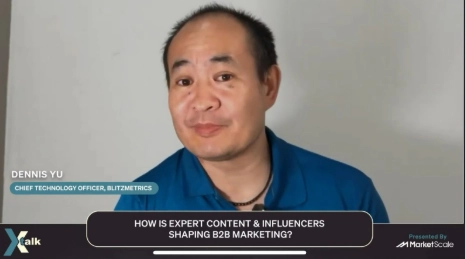
UGC is one of the most effective strategies in modern marketing. Perry Marshall demonstrates this by interviewing clients and turning real stories into impactful content.

With just a 45-minute webinar, you can create TikToks, Instagram Reels, LinkedIn posts, and blog articles. This scalability maximizes ROI and ensures your message reaches multiple platforms.
David suggests ‘Reverse PR.’ Instead of chasing earned media, bring experts onto your platform. Interview a VP of revenue cycle, for example, and let their insights expand your network organically.
David highlights LinkedIn as a powerful platform for creator influence. While still developing, it’s ideal for those who post consistently and share relevant, timely content. Pairing this with a guest who addresses real challenges turns your content into problem-solving, not just marketing.
In B2B, David emphasizes that trust and credibility are essential. Presenting actionable solutions through people who’ve faced and overcome challenges builds strong business relationships.
Overcoming B2B Skepticism Towards Influencer Marketing
David highlights the skepticism B2B companies have historically had toward influencer marketing. In the past, the workplace wasn’t seen as a place to share opinions or expertise. While the consumer world embraced content creation and engagement, B2B stuck to reserved, traditional methods.
For years, B2B marketing relied on a small team to produce content for the entire company. It wasn’t scalable, and buyers today expect more than trade shows and expensive ad campaigns. People don’t like being advertised to, so why keep pushing ads on customers when they don’t work?
Now, things are shifting. In their personal lives, buyers expect genuine brand interactions, and that expectation is spilling into B2B. Businesses are realizing that empowering employees, sharing knowledge, and elevating real experts build trust and foster connections far better than outdated tactics.
Why B2B is Ready for Influencer Marketing
B2B has been slow to adopt influencer marketing because of fear—fear of being judged, fear of breaking traditional processes, and fear of doing something different. But that fear is holding businesses back.
In every other area of life, people are encouraged to share their expertise. Yet, in B2B, the workplace often feels like the last place you’re allowed to speak up. That’s changing, but it’s a fight against old habits.
The traditional approach of a marketing team creating all the content isn’t enough anymore. Buyers don’t want glossy ads or four trade shows a year—they want authenticity. Influencer marketing isn’t about paying celebrities; it’s about co-creating content with real experts and sharing their stories.
GoDaddy, are creating raw, authentic ads filmed with phones in their hallways. It’s not polished, but it feels real, and that’s what connects with people. You don’t need a fancy studio or expensive production. Buyers want to feel like they’re FaceTiming a friend, not watching a commercial.
Here’s the kicker: the B2B sales cycle has gone from 6–10 touches to over 60–70 touches. Buyers are smarter and more skeptical than ever. But co-creating content with experts builds trust faster. It’s not about you being the expert; it’s about asking the right questions and letting your network share their insights.
So, why aren’t more B2B companies doing this? Fear. Fear of looking bad or breaking the status. But the companies that win are the ones that stop overthinking and start asking. You’d be amazed how many people want to help and share their knowledge if you just ask.
Effective Strategy for B2B Influencer Marketing
Start by interviewing three of your customers, not just your top ones, but those with relatable stories. Share their success and tag them in the content, turning them into advocates for your brand.
Next, interview colleagues or industry peers, such as a VP of Engineering or someone you met at a conference. This not only adds credibility but also expands your network. Then, reach out to three more people through friend-of-a-friend connections. Now, you have nine people lined up for interviews.
Keep the interviews short, 30 minutes max. Use tools like ChatGPT or Google’s PAA to come up with relevant, industry-specific questions. After the interview, record a quick promo or hook to tease the content, think of it as a movie trailer designed to get people excited to watch or listen.
Repurpose the content with tools like Descript to create social media clips, articles, and YouTube videos. This approach gives you weeks of content from just a few interviews. Then, test what works. Run small ads on LinkedIn, Facebook, or YouTube to see which clips drive the most engagement and leads.
Measuring ROI in B2B Influencer Marketing
David highlights that measuring ROI is straightforward. He uses a relatable analogy: “What’s the ROI of your mom? It’s everything, right?” But practically speaking, ROI in influencer marketing comes down to comparing it against your current marketing costs.
For example, if your average cost per lead is $72 and your cost per qualified lead is $120, the question is simple, can influencer marketing beat those numbers? If it can, you’ve already won.
Track your cost per lead consistently and see how it stacks up over time. The biggest mistake David sees is expecting results from one or two videos or a single podcast.
As you continue to create and analyze your content, ask yourself: Did I spend less? Did I make more? If the answer is yes, you’re on the right track. That’s why leading B2B brands are adopting this strategy—it’s cost-effective, scalable, and gives them a clear edge in the market.
David emphasizes that success comes from staying the course. The opportunity to stand out is there, but only if you commit to the process.
The Future of Influencer Marketing
B2B influencer marketing is evolving rapidly and will look very different over the next five years. While B2C business remains focused on ads, product placements, and paid sponsorships, B2B will center on authentic relationships.
David highlights that B2B success will rely on influencers who genuinely believe in and use the products or services they promote. The power lies in influencers with a personal connection to the brand, not polished spokespeople.
As the creator economy grows, B2B companies must refine how they create and repurpose content. Interviews or summaries can be transformed into lead magnets like eBooks or guides. Platforms such as LinkedIn, Facebook, TikTok, and YouTube can then use lead ads to capture email addresses.
David emphasizes that tools like conversion APIs will improve measurement and enhance SEO through social signals and engagement. Businesses that create content answering real questions will outperform competitors. Most companies haven’t even started, leaving room for those who take action now.
Embracing Authenticity in the Age of AI
AI is transforming how buyers discover businesses. Tools like ChatGPT influence recommendations, and if your content isn’t part of that ecosystem, your business risks being ignored. David states, “AI is the new gatekeeper. Without active content creation, you’re invisible.”
David recalls how handwritten letters once built strong connections. The same principle applies today, authenticity matters more than perfection, whether in video or written content.
Take Tesla, for example. If Elon Musk avoided interviews due to his unconventional style, it would have been a huge loss. Instead, Tesla embraced his authenticity, which strengthened the brand.
David urges marketing leaders to overcome their fear of being judged or disliking their on-camera presence. The future of B2B influencer marketing relies on authenticity, valuable content, and consistency.
Stop overthinking and start engaging your audience. The opportunity to lead is wide open, but only for those willing to act.






